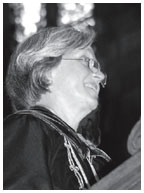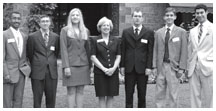President Tilghman
giving
Honored for their academic achievements by Dean of the College Nancy Weiss Malkiel (center) were (from left) Freshman First Honor Prize winner Lester Mackey ’07, George B. Wood Legacy Sophomore Prize winner Michael Broache ’06, George B. Wood Legacy Junior Prize co-winner Megan Cunningham ’05, Class of 1939 Princeton Scholar Award co-winner Mihai Manea ’05, George B. Wood Legacy Junior Prize co-winner Jesse Levinson ’05, and Class of 1939 Princeton Scholar Award co-winner Joshua Geltzer ’05. The full story on the awards is available online at www.princeton.edu/ pr/news/04/q3/0905-openex.htm. |
Opening Exercises On September 5, in our beautiful University Chapel, I welcomed the 1,177 members of the Class of 2008, 541 new graduate students, and other newcomers to our campus. As in previous years, I would like to share some excerpts from my address to freshmen with you.
As University president, I have the good fortune to serve as an oratorical bookend to your time at Princeton, bidding you welcome now and bidding you farewell at Commencement. The four years in between will be, undoubtedly, among the most important in your lives, but I warn you that they will fly by with unnerving speed. During these short years you will take the last steps into adulthood, and will make friends you will cherish for the rest of your lives. And if the University has done its job well, you will be poised as you leave this privileged place to assume the mantle of the next generation of leaders in your communities and your fields of endeavor, whether it be teaching kindergarten or developing the first vaccine for HIV/ AIDS or working toward global security—in Nome, Alaska, Laikipia, Kenya, or Shanghai, China.
However, the most immediate challenge that you face is remaining cool, calm, and collected, a mantra that also comes in handy when balancing your budget or dealing with the traffic on Route 1. I have no doubt that you are feeling rather nervous, and that elation and self-doubt are vying for the forefront of your minds. It may, however, comfort you to know that what you are experiencing now is nothing new, and is shared by every newcomer who has ever sat in this chapel. A freshman, arriving on our campus 22 years ago, had this to say about her first impressions:
“When I first wandered through Holder Hall, searching for the one door with my number on it, climbing flight after flight of stairs, seeing face after unfamiliar face, I looked at my mom and thought maybe going home wouldn’t be such a horrible idea. Then when my key wouldn’t work without violent manipulation, and I found the bathroom four flights down and four entryways over, I seriously thought about heading for the green station wagon.” I am pleased to report that this woman went on to have a very successful Princeton career, and that Holder Hall is being renovated this year so that henceforward no bathroom will be more than one flight of stairs away.
Like this alumna, you will master the geography of your dormitories, you will find the room assignments for all your classes, and you will not be forced to wander for eternity in Firestone Library’s oldest and darkest stacks. Jadwin Gymnasium will come to feel like home court as you cheer on the Tigers, and, yes, this lofty chapel will become the place where you will want to be married. I do have one disappointment, however, for those of you who may have read The Rule of Four, the exciting thriller set on the Princeton campus and written by Ian Caldwell of the Princeton Class of 1998 and Dustin Thomason, who attended some other college to the north of here. You can just forget about looking for the steam tunnels— they don’t exist!
What does exist at Princeton is the opportunity for each of you to explore an extraordinarily rich smorgasbord of the world’s knowledge and ideas. This fall alone we are offering 648 undergraduate and 381 graduate courses, sprinkled among 110 departments and programs, from environmental studies to Slavic languages and literatures to applied and computational mathematics. When faced with this variety of choice, I understand that it is tempting to fall back upon what is familiar and safe. But I would urge you to do just the opposite, and instead adopt the attitude of an explorer. This may be the only point in your life when you can study the comedies of Molière or conquer the paradoxes in Schrödinger’s equation; you may never again have time or motivation to compose music or participate in an archeological dig or figure out how wireless computers really work.
On the other hand, you should also feel free to respond to the interests and passions that you bring to Princeton. Neil Rudenstine, the past president of Harvard and—I am happy to say—a graduate, former provost, and current trustee of Princeton, addressed the role of these “subjective passions” at our Opening Exercises in 1980, and I would like to share his words with you today.
“Education is what results when we pursue those interests and concerns that have the strongest and most irresistible hold on us. It comes from those moments when we are drawn by something and feel compelled to understand as much as we possibly can about it—whether it is some part of nature, or a work of art, or a mathematical problem, or an historical event, which we simply cannot leave alone until we have done all we can to explain or master it, and in some sense take possession of it.”
I urge you, then, to take possession of the questions that excite you most, whether you find them in books, in Petri dishes, or in computer programs. If you do so unreservedly, you will find that the bewildering number of choices that confronts you now will narrow to the point that you can advance with confidence. There will still be plenty of room for side trips, but you will never lose sight of your ultimate destination.
You may also find it helpful to bear in mind that your primary mission at Princeton is less to acquire a specific body of knowledge than to master the skills you need to make the most of any body of knowledge. A university education is more than studying the structure of DNA or the sources of the Enlightenment, important though these subjects are.
Your overriding goal should be to hone the intellectual tools you need to discriminate between fact and fiction; to pose tough questions and provide full answers; to observe acutely and interpret soundly; to articulate your arguments in a concise and cogent fashion; and to be open to other ideas without surrendering your own.
This brings me to another challenge that all of you will face in varying degrees. In the presence of so much knowledge, it is easy to assume the passive role of scribe, absorbing the pearls of wisdom that your professors share with you and deferring to their indisputable expertise. You may have led your class in high school, but now you are surrounded by a veritable galaxy of stars, and so—you say to yourself—perhaps it would be best if I let their light subsume my own. This would be a terrible mistake, for in a true community of scholars, knowledge springs from dialogues—the livelier the better.
Our preceptorial system, established by Woodrow Wilson in 1905, is predicated on this free exchange of ideas and gives you, the undergraduate, both an opportunity and an obligation to uphold your interpretations, muster your arguments, and test your hypotheses. As Wilson put it, “If you want to know what I know about a subject, don’t set me up to make a speech about it, because I have the floor and you cannot interrupt me. . . . If you really want to know what I know, sit down and ask me questions, interrupt me, contradict me, and see how I hold my ground. . . . If that method were followed, the undergraduate might make many a consoling discovery of how ignorant his professor was, as well as many a stimulating discovery of how well informed he was.”
So, take Wilson’s words to heart. Your professor may be a Nobel laureate in medicine or a Field medalist in mathematics or a Pulitzer-Prize winner in poetry, but he or she can still learn something from you, just as you have much to learn from him or her.
Of course, your Princeton education does not begin or end in the classroom, but spills out into the playing fields, the performance stages, and into the community. Here, too, you will be forced to make wise choices about how you will invest your most precious resource—which is your time. Last year our campus harbored no fewer than 226 registered undergraduate student organizations, ranging from the Princeton Redheads Society— I kid you not—to Theatre Intime to club, intramural, and varsity sports. When you visit the Student Activities Fair at Dillon Gymnasium on Friday, you will encounter possibilities that could leave you without any free time for the next four years. These extracurricular activities are sources of friendships, fun and relaxation, and personal growth, and they will form an important part of your Princeton experience.
For the next four years, you will have the luxury of living in a place that many view as just “This Side of Paradise,” the title of F. Scott Fitzgerald’s famous novel about Princeton. This campus is stunningly beautiful, our campus family is close and supportive, and the greater Princeton community in which we reside is safe and welcoming. In important ways, the tranquility of our ivy-clad setting encourages you to lose yourself in your studies, whether you are exploring the past or imagining the future.
But let us not forget that the purpose of this four-year hiatus is to prepare yourselves for the world outside the FitzRandolph Gates—which will return to their appointed place fully restored long before you are ready to leave. The challenge facing you is to embrace your studies in a way that only a university such as ours allows, but to do so without losing sight of the ultimate purpose of those studies. This purpose, in its most basic form, is to make our world a better place ethically, economically, socially, politically, environmentally, and in a host of other ways, not just because you have to live in this world yourselves but because more than 6.3 billion other people do as well.
Let me conclude by expressing my hope that the next few years will not
only meet your expectations, but surpass them. For myself, I am looking
forward to getting to know each of you and to cheering you on inside and
outside the classroom as you chart your course through this great University.
I hope that you will leave Princeton saying, as so many have before you,
“This place changed my life.” Welcome to Princeton!
![]()



